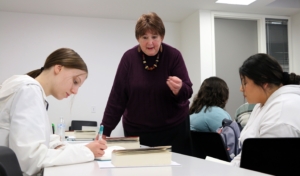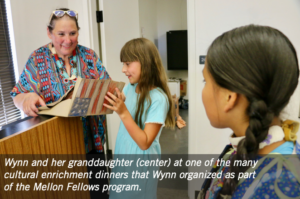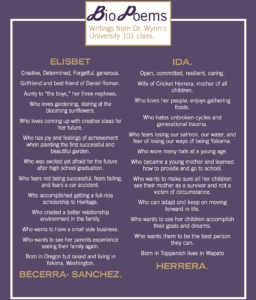The Storyteller

When Winona Wynn was one year old, her father took her to Yellowstone National Park. He pulled up under a cluster of pine trees, took her out of the car, and stood her on its hood. With his arms and the natural world both extending their embrace, his daughter took her first steps.
“My dad told me that when you take your first steps in the woods, you learn to walk in the woods as part of your whole being,”
Wynn said. “He embodied the traditions of our people and passed that spirituality and love on to me. It’s part of who I am today.”
In a life that has included significant personal challenges, Winona Wynn has been sustained and shaped by her spiritual worldview – as well as by something she’s always known would give her and her children a better life: education.
Blessed by her experiences, both the positive and the challenging, it’s been her privilege, she says, to pass on lessons learned.
As a Heritage University humanities professor, Wynn lives her commitment to the value of education. She believes part of her role as an educator is to ensure students know they are seen and heard as they take their first steps in the world of higher education.
Over 14 years of teaching, she’s built a classroom atmosphere that’s both interpersonal, focusing on communication between herself and her students, and intrapersonal, where the focus is reflective and empowering for the students themselves.
“Part of students’ education at Heritage needs to be about their journey toward recognizing their unique gifts and valuing their capacity to contribute,” she says. “That takes understanding and commitment from the people who are here. We share an obligation to lead them and teach them.
ADJUST YOUR MIND!
An enrolled member of the Assiniboine/Sioux Tribe of Ft. Peck, Montana, Wynn was raised in several geographic locations in what she calls a “reservation home.” Her father was a 30-year Air Force veteran, and although moves were frequent, she and her siblings remained connected to their roots through storytelling and visits when possible.

Dr. Winona Wynn leads students through a writing exercise in her University 101 class.
Her home life was complicated but interwoven with inspiration. She recalls her parents’ guidance.
“When our days and nights were tough, my dad would utter his favorite three words of advice, ‘Adjust your mind,’ and my mother would echo ‘This is a learning time. Let’s be grateful.’ I passed their wisdom on to my children.”
Wynn married at 21 and had four children. But it was a difficult relationship, and after years of documented domestic abuse, late one night, she left everything, took her children, and boarded a train to California to solicit support from her parents.
Working three jobs to support herself and her family, Wynn knew: Finding a way to continue the educational path she’d left behind was the only way to a better life.
It was during that time that she signed up for some life-changing classes at the local community college: Sociology and Psychology 101, and it was in those classes that she bonded with a determined group of students.
“We were all just starting out or starting over, and we were there for each other,” she says. “But not all of us made it.”
Of that handful of friends, only Wynn and one other would ultimately finish college. One became addicted to drugs, and another died by suicide.
“There were so many times during those challenging days that I told my children what my parents said: We’ve got people around us who don’t see any light, but we do.’”
A VISION FOR EDUCATION
Transitioning back to Washington, with her four children and a sister in tow, a better life began when Wynn enrolled at Eastern Washington University, and a friend asked her to attend a session about the McNair Scholars Program. If she applied and was accepted, it would mean support for her academic dreams.
During the selection process, “I just told them my truth: ‘I’m a single parent with a vision for education for myself and my children,’” Wynn says. “One of them believed in me. She said my determination, goals and vision convinced her, then she advocated for me to the others.”
That person, Dr. Karen McKinney, would be a guiding light in Wynn’s educational journey – her mentor for the next 12 years, as Wynn navigated her undergraduate program, graduate studies and pursuit of her Ph.D.
“My motivation always came from difficulty,” she says. “And the fact that I knew people who had come from similar trauma but managed to achieve.”
“It was in large part due to the people in my life – my parents, my college friends, Dr. McKinney, my children, my sister, and, even now, people here at Heritage – that I’ve persevered.”
“I’m thankful for what I’ve learned, for where I am, for all the people in my life. Being thankful lifts us up, inspires hope, and moves us beyond moments of incomprehensible grief, reminding us that each experience is a gift.”
A PURPOSE TOGETHER
For Wynn, gratitude and care for others translate into a desire to be present for her students. Upon entering Wynn’s classroom, each new student is warmly welcomed.
“For me, it’s like, ‘I’ve never met you, but I know we have a purpose together,’” she smiles.
Each first class starts with a “BioPoem” – a sort of biographical poem that students write about themselves. “It’s how we start talking about who we are. I ask them to write about what they believe, what they’re afraid of, what they hope for, and it becomes an authentic connection for our classroom learning community.”
Wynn has a quote about the humanities that she likes to share: “The humanities are our attempt to understand and communicate the human experience through language. They help us see the wider view of our lives.”
“Understanding our lives helps us to keep taking our steps,” she says. “That’s everything I want for my students.”

